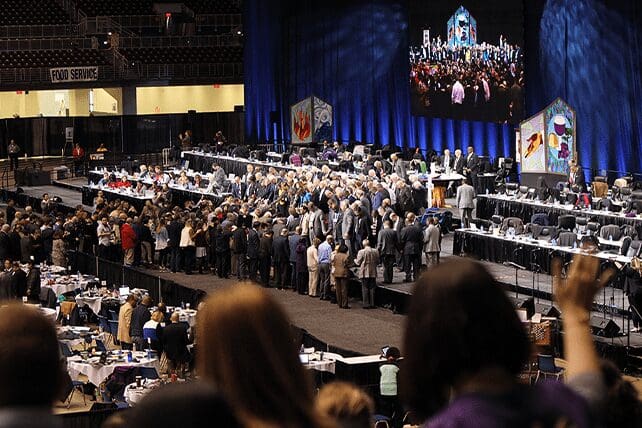Florida has emerged as an early indicator of what schism may look like as it begins to unfold across the United Methodist Church.
Days after the Global Methodist Church launched in May, the Wesleyan Covenant Association’s Florida chapter announced 107 churches were disaffiliating from the United Methodist Church and planning to join the new denomination. The WCA confirmed most of those churches are participating in the new lawsuit.

Branding and logo of the Global Methodist Church, which is splitting from the United Methodist Church. Image courtesy of Global Methodist Church
At the Florida Annual Conference meeting this summer, delegates reportedly rejected a slate of 16 people on track to become ordained elders or deacons because two of them were openly gay.
They also approved 14 disaffiliations.
Boyette, head of the Global Methodist Church, said he expects those numbers to increase this fall when a number of United Methodist annual conferences are scheduled to hold special sessions regarding disaffiliations.
“Most of those churches are making their way to the Global Methodist Church,” he said.
That includes “virtually all” of the churches named in the lawsuit against the Florida Annual Conference, according to Boyette, who said he is not involved in the lawsuit.

The Rev. Keith Boyette. Photo courtesy of Wesleyan Covenant Association
The Global Methodist Church launched this year after a third postponement of the United Methodist Church’s 2020 General Conference, which was set to consider a proposal to split the denomination, allowing churches to disaffiliate with their properties to form new conservative expressions of Methodism. It now has several hundred clergy and nearly 100 churches worldwide, Boyette said.
In recent weeks, moderate and progressive leaders who helped negotiate the proposal, called the Protocol of Reconciliation & Grace Through Separation, have rescinded their support. Bishops who were part of the negotiating team, including Carter, released a statement affirming the work that had been done on the proposal and trusting it to delegates who may still consider it at the next General Conference, now scheduled for 2024.
Meanwhile, Boyette said, some annual conferences are requiring lengthy discernment periods and additional financial obligations that weren’t outlined in the 2019 disaffiliation plan from churches wishing to leave.
“All of that has taken a situation that could have been and was directed in an amicable way toward resolution to make it a very contentious, conflicted situation,” he said.
“So, in my mind, it’s not surprising that churches feel like they have no recourse but to resort to litigation at this point, and that’s what essentially I believe that leadership in the United Methodist Church has invited by taking the steps that they’ve taken,” Boyette added.
This article originally appeared here.

